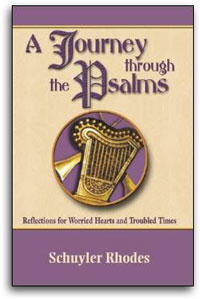Psalm 32
Preaching
A Journey Through the Psalms: Reflections for Worried Hearts and Troubled Times
Preaching the Psalms Cycles A, B, C
Forgiveness is difficult. Oh, with little things it can be done. Someone slips up and causes inconvenience. A little white lie here, a small mistreatment there, can be dismissed. But with the big things, it is not an easy matter. Who forgives betrayal in marriage? Who forgives a deliberate attempt to hurt or wound? Who forgives a rapist or a murderer? Who forgives an invading, rampaging army? Who forgives us for the litany of wrongs that can be laid at our doorsteps?
Yet, forgiveness is the key to new life. Indeed, forgiveness is key to the continuation of life itself.
This psalm speaks to forgiveness from the point of view of confession. It is, in a sense, formulaic. First confession, then forgiveness, then a new beginning. The confession piece of this equation is critical. In fact, it is almost as though the deceit surrounding the wrongful act is worse than the act itself.
Isn't this true? It's bad enough that someone has been wronged, but when the perpetrator lies about the wrong and it is as though the infraction never took place, that's when things really get bad. If, however, the guilty party confesses -- tells the truth -- apologizes -- forgiveness, and therefore a new beginning, becomes possible.
This dramatic process has been seen in the unfolding of the Truth and Justice Commissions in South Africa and in Guatemala after decades of horrible repression, violence, and murder. Those who committed the crimes came forward and told the truth. These were truths that staggar the imagination. Midnight kidnappings and murders, tales of death squads and massacres, and details too horrible to discuss here. Yet the truth was told.
In light of all this, it's distressing to note that many Protestant communities shy away from confession these days. In an effort to avoid "guilting" people, this most powerful and restorative process has been abandoned. One wonders if it might be retrieved. Deitrich Bonhoeffer felt that the Protestant church ought to return to the confessional for reasons quite similar to this.
The question that comes seems clear. What is the location of confession and forgiveness in the life of our nation? Where might this nation benefit from confession? Like any world power in history, the list here is long. From slavery to wars of empire, what would national confession look like? Where might our communities benefit from the truthfulness of confession? What truths might be told about homelessness and poverty? About racism and power?
And, of course, we cannot neglect our congregations. What healing truths might our churches tell? The list, of course, continues to narrow until at last we confront the one in the mirror.
Whether it is the sins of nations or the vagaries of one person, this psalm gets it right. Confession is good for the soul.
Yet, forgiveness is the key to new life. Indeed, forgiveness is key to the continuation of life itself.
This psalm speaks to forgiveness from the point of view of confession. It is, in a sense, formulaic. First confession, then forgiveness, then a new beginning. The confession piece of this equation is critical. In fact, it is almost as though the deceit surrounding the wrongful act is worse than the act itself.
Isn't this true? It's bad enough that someone has been wronged, but when the perpetrator lies about the wrong and it is as though the infraction never took place, that's when things really get bad. If, however, the guilty party confesses -- tells the truth -- apologizes -- forgiveness, and therefore a new beginning, becomes possible.
This dramatic process has been seen in the unfolding of the Truth and Justice Commissions in South Africa and in Guatemala after decades of horrible repression, violence, and murder. Those who committed the crimes came forward and told the truth. These were truths that staggar the imagination. Midnight kidnappings and murders, tales of death squads and massacres, and details too horrible to discuss here. Yet the truth was told.
In light of all this, it's distressing to note that many Protestant communities shy away from confession these days. In an effort to avoid "guilting" people, this most powerful and restorative process has been abandoned. One wonders if it might be retrieved. Deitrich Bonhoeffer felt that the Protestant church ought to return to the confessional for reasons quite similar to this.
The question that comes seems clear. What is the location of confession and forgiveness in the life of our nation? Where might this nation benefit from confession? Like any world power in history, the list here is long. From slavery to wars of empire, what would national confession look like? Where might our communities benefit from the truthfulness of confession? What truths might be told about homelessness and poverty? About racism and power?
And, of course, we cannot neglect our congregations. What healing truths might our churches tell? The list, of course, continues to narrow until at last we confront the one in the mirror.
Whether it is the sins of nations or the vagaries of one person, this psalm gets it right. Confession is good for the soul.


